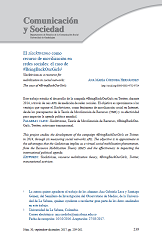El slacktivismo como recurso de movilización en redes sociales: el caso de #BringBackOurGirls
DOI:
https://doi.org/10.32870/cys.v0i30.6241Palabras clave:
Slacktivismo, Teoría de Movilización de Recursos, #BringBackOur- Girls, Twitter, activismo transnacionalResumen
Este trabajo estudia el desarrollo de la campaña #BringBackOurGirls en Twitter, durante 2014, a través de seis APIs de medición de redes sociales. El objetivo es aproximarse a las ventajas que supone el Slacktivismo, como fenómeno de movilización social en Internet, desde los presupuestos de la Teoría de Movilización de Recursos (TMR) y su efectividad para impactar la agenda política mundial.Descargas
Citas
Abdullahi, I. M. (2014). Yes #BringBackOurDaughters #BringBackOurGirls declared by @obyezeks and all people at Port Harcourt World Book Capital 2014. [Tuit]. Recuperado de https://twitter.com/abu_aaid/status/458935571076100096
Anduiza, E., Gallego, A. & Jorba, L. (2009). The Political Kowledge Gap in the New Media Enviroment: Evidence from Spain, Joint Sessions of the ECPR. Simposio llevado a cabo en la conferencia de European Consortium for Political Research, Lisboa.
Anduiza, E., Gallego, A. & Cantijoch, M. (2010). Los usos políticos de Internet en España. Revista española de Investigaciones Sociológicas, (129), 133-146. Recuperado de http://www.reis.cis.es/REIS/PDF/REIS_129_051262609304456.pdf
Bajo, C. (14 de mayo de 2014). El ‘hashtag’ del secuestro. El secuestro del ‘hashtag’. El País. Recuperado de: http://elpais.com/elpais/2014/05/13/planeta_futuro/1399988511_367696.html
Bakshy, E., Hofman, J. M., Mason, W. A. & Watts, D. J. (2011). Everyone's an influencer: quantifying influence on twitter. En ACM (Ed.), Proceedings of the fourth ACM international conference on Web search and data mining, 65-74.
Batlle, A. & Cardenal, A. S. (2006). La utopía virtual: Una crítica al ciberoptimismo desde la teoría de la elección racional. Revista de Internet, Derecho y Política, (3), 1-12. doi:10.7238/idp.v0i3.396
Bennett, W. L. & Segerberg, A. (2012). The logic of connective action. Information, Communication & Society, 15(5), 739-768. doi:10.1080/1369118X.2012.670661
Bennett, W., Breunig, C. & Given, T. (2008). Communication and Political Mobilization: Digital Media and the Organization of Anti-Iraq War Demostrations in the U.S. Political Communication, 25(3), 269-289. doi:10.1080/10584600802197434
Berger, J. y Milkman, K. (2012). What Makes Online Content Viral? Journal of Marketing Research, 49(2), 192-205. doi:10.2139/ssrn.1528077
Berry, D. (2011). The Computational Turn: Thinking About the Digital Humanities. Culture Machine, 12(2), 1-22. Recuperado de http://www.culturemachine.net/index.php/cm/article/viewArticle/440
Best, S. &y Krueger, B. (2005). Analyzing the representativeness of Internet political participation. Political Behavior, 27(2), 183-216. doi:10.1007/s11109-005-3242-y
Bimber, B. (2000). The study of information technology and civic engagement. Political Communication, 17(4), 329-333. doi:10.1080/10584600050178924
Bimber, B. (2001). Information and political engagement in America: The search for effects of information technology at the individual level. Political Research Quarterly, 54(1), 53-67. doi:10.1177/106591290105400103
Bogart, N. (9 de mayo de 2014). Can social media really help #BringBackOurGirls and end terrorism in Nigeria? Globalnews. Recuperado de http://globalnews.ca/news/1321755/can-social-media-really-help-bringbackourgirls-and-end-terrorism-in-nigeria/
Borge, R., Cardenal, A. S. &y Malpica, C. (2012). El impacto de Internet en la participación política: revisando el papel del interés político. Arbor, 188(756), 733-750. doi:10.3989/arbor.2012.756n4008
Borra, E. & Rieder, B. (2013). Programmed method: developing a toolset for capturing and analyzing tweets. Aslib Journal of Information Management, 66(3), 262-278.
Boyd, D. & Crawford, K. (2012). Critical questions for big data: Provocations for a cultural, technological, and scholarly phenomenon. Information, Communication & Society, 15(5), 662-679. doi:10.1108/AJIM-09-2013-0094
Butler, M. (2011). Clicktivism, Slacktivism, or ‘Real’ activism, cultural codes of american activism in the internet era. Tesis de Maestría: University of Colorado. Recuperado de http://scholar.colorado.edu/comm_gradetds/12/
Cantijoch, M. (2009). Reinforcement and mobilization: the influence of the Internet on different types of political participation. Presentado en el seminario Citizen Politics: Are the New Media Reshaping Political Engagement? Barcelona: IGOP.
Chiluwa, I. & Ifukor, P. (2015). ‘War against our Children’: Stance and evaluation in #BringBackOurGirls campaign discourse on Twitter and Facebook. Discourse & Society , 26(3), 267-296. doi:10.1177/0957926514564735
Christensen, H. (2011). Political activities on the Internet: Slacktivism or political participation by other means. First Monday, 16 (2). Recuperado de 10 de 2016 de http://firstmonday.org/ojs/index.php/fm/article/view/3336/2767
Clarín (9 de Septiembre de 2014). El "ice bucket" rompió el récord en Youtube. El Clarín. Recuperado de http://www.clarin.com/sociedad/reto-ice-bucket-record-Youtube_0_1208879387.html
Collins, M. (9 de mayo de 2014). #BringBackOurGirls: the power of a social media campaign. The Guardian. Recuperado de http://www.theguardian.com/voluntary-sector-network/2014/may/09/bringbackourgirls-power-of-social-media
Dankhe, G. (1989). Investigación y comunicación. En C. Fernández-Collado & G. Dankhe (Eds.), La comunicación humana: ciencia social (pp. 385-454). México: McGraw-Hill.
De Marco, S. & Robles Morales, J. M. (2012). Uso de los blogs políticos: análisis de algunos factores determinantes. Arbor, 188 (756), 689-705. doi:10.3989/arbor.2012.756n4005
Delli Carpini, M. (2000). Gen.com: Youth, civic engagement, and the new information environment. Political Communication, 17 (4), 341-349. doi:10.1080/10584600050178942
Di Genaro, C. & Dutton, W. (2006). The Internet and the public: Online and offline political participation in the United Kingdom. Parliamentary Affairs, 59 (2), 299-313. doi:10.1093/pa/gsl004
Edwards, B. & McCarthy, J. (2004). Resources and social movement mobilization. En D. Snow, S. Soule & H. Kriese (Eds.), The Blackwell Companion to Social Movements, (pp 116-152). Malden, MA: Blackwell.
El País (15 de abril de 2014). Boko Haram secuestra a más de 100 niñas de una escuela en Nigeria. El País. Recuperado de http://internacional.elpais.com/internacional/2014/04/15/actualidad/1397576564_628164.html
Fernández, C. (10 de mayo de 2014). “Michelle Obama se muestra “indignada” por el secuestro de las niñas nigerianas. El País. Recuperado el 9 de 12 de 2014, de http://internacional.elpais.com/internacional/2014/05/10/actualidad/1399731624_204741.html
García, M. y del Hoyo, M. (2013). Redes sociales, un medio para la movilización juvenil. Zer, 18 (34), 111-125. Recuperado de http://www.ehu.eus/zer/es/hemeroteca/articulo/redes-sociales-un-medio-para-la-movilizacin-juvenil/517
Gibson, R. K., Lusoli, W. & Ward, S. (2005). Online Participation in the UK: Testing a ‘Contextualised’ Model of Internet Effects. The British Journal of Politics & International Relations, 7(4), 561-583. doi:10.1111/j.1467-856x.2005.00209.x
Gladwell, M. (28 de octubre de 2010). Why the revolution will not be tweeted. The New Yorker Recuperado de http://www.newyorker.com/magazine/2010/10/04/small-change-malcolm-gladwell
Glenn, C. L. (2015). Activism or “Slacktivism?”: Digital Media and Organizing for Social Change. Communication Teacher, 29 (2), 81-85. doi:10.1080/17404622.2014.1003310
Henríquez, M. (2011). Clic Activismo: redes virtuales, movimientos sociales y participación política. Faro, 1 (13), 29-41. Recuperado de http://web.upla.cl/revistafaro/n13/art04.htm
Hernández, R., Fernández, C. & Baptista, P. (2006). Metodología de la investigación. México: Mc Graw Hill.
Jenkins, J. C. (1982). The Transformation of a Constituency into a Movement. En J. Freeman (Ed.), The Social Movements of the 1960s and the 1970s. (pp. 277-302). Nueva York: Longmans.
Karakaya, R. (2005). The Internet and Political Participation. Exploring the Explanatory Links. European Journal of Communication, 20 (4), 435-559. doi:10.1177/0267323105058251
Kiesler, S., Zdaniuk, B., Lundmark, V. & Kraut, R. (2000). Trobules with the Internet: The dynamics of help at home. Human-Computer Interaction, 15, 323-351. doi:10.1207/S15327051HCI1504_2
Knibbs, K. (16 de mayo de 2013). Slactivists, unite! Social media campaigns aren’t just feel-good back patting. Digital Trends. Recuperado de https://www.digitaltrends.com/opinion/slacktivists-unite-social-media-campaigns-arent-just-feel-good-back-patting/
Lee, Y. H., & Hsieh, G. (2013). Does slacktivism hurt activism?: The effects of moral balancing and consistency in online activism. In Conference on Human Factors in Computing Systems - Proceedings. (pp. 811-820). DOI: 10.1145/2470654.2470770
Litoff, A. (6 de mayo de 2014). ‘Bring Back Our Girls’ becomes rallying cry for kidnapped Nigerian schoolgirls. ABC News. Recuperado de http://abcnews.go.com/International/bring-back-girls-rallying-cry-kidnapped-nigerian-schoolgirls/story?id=23611012
Lomborg, S. & Bechmann, A. (2014). Using APIs for data collection on social media. The Information Society, 30(4), 256-265. doi:10.1080/01972243.2014.915276
Lyons, K., Robinson, W. & Chorley, M. (8 de mayo de 2014). Bring Back Our Girls: Michelle Obama and Malala join campaign to free 276 Nigerian teenagers kidnapped by Islamic extremists. Dailymail. Recuperado el 27 de 09 de 2015 de http://www.dailymail.co.uk/news/article-2622999/Celebrities-join-campaign-bring-kidnapped-Nigerian-girls.html
Margolis, M. & Resnick, D. (2000). Politics as Usual: The Cyberspace ‘Revolution’. Thousand Oaks: Sage.
McCarthy, J. D. & Zald, M. N. (1977). Resource Mobilization and Social Movements. American Journal of Sociology, 82 (6), 1212-1241. Recuperado de http://www.jstor.org/stable/2777934
Morozov, E. (19 de mayo de 2009). The brave new world of slacktivism. Foreign Policy. Recuperado de http://foreignpolicy.com/2009/05/19/the-brave-new-world-of-slacktivism/
Morozov, E. (2011). The Net Delusion: The Dark Side of Internet Freedom. Nueva York: Public Affairs, Perseus Book.
Morse, F. (13 de mayo de 2014). ‘The Bring Back Our Girls’ campaign is working: Boko Haram should be scared of a hashtag. The Independent. Recuperado de http://www.independent.co.uk/voices/comment/the-bring-back-our-girls-campaign-is-working-boko-haram-should-be-scared-of-a-hashtag-9360830.html
Neubauer, M. (7 de mayo de 2014). #BringBackOurGirls: How a Hashtag Took Hold. TechPresident. Recuperado de http://techpresident.com/news/24996/bringbackourgirls-how-hashtag-took-hold
Norris, P. (2001). Digital divide: Civic engagement, information poverty, and the Internet worldwide. Cambridge: Cambridge University Press.
Olson, M. J. (1968). The Logic of Collective Action. Nueva York: Schocken Books.
Ortíz, R. (2015). Los cibermovimientos sociales. Nuevas oportunidades comunicativas en la era de Internet y de la Web social, nuevas posibilidades de transformación democrática (Tesis doctoral) Pamplona: Universidad de Navarra.
Putnam, R. (2000). Bowling Alone. Nueva York: Simon and Schuster.
Quintelier, E. & Vissers, S. (2008). The Effect of Internet Use on Political Participation. An Analysis of Survey Results for 16-year-olds in Belgium. Social Science Computer Review, 26 (4), 411-427. doi:10.1177/0894439307312631
Resina de la Fuente, J. (2010). Ciberpolítica, redes sociales y nuevas movilizaciones en España: El impacto digital en los procesos de deliberación y participación ciudadana, Mediaciones Sociales. Revista de Ciencias Sociales y de la Comunicación, 7, 143-164.
Rheingold, H. (2002). Smart Mobs: The Next Social Revolution. Cambridge: Basic Books.
Rogers, M. (1974). Instrumental and Infra-resources. American Journal of Sociology 79 (6), 1418-1433. Recuperado de http://www.jstor.org/stable/2777142
Rogers, M. (1974). Instrumental and Infra-resources. American Journal of Sociology 79 (6), 1418-1433. Recuperado de http://www.jstor.org/stable/2777142
Sampedro, V. (2005). 13M: Multitudes Online. Madrid: La Catarata.
Tilly, C. (1978). From Mobilization to Revolution. Reading: Addison-Wesley.
Vie, S. (2014). In defense of “slacktivism”: The Human Rights Campaign Facebook logo as digital activism. First Monday, 19 (4). doi:10.5210/fm.v19i4.4961
Ward, S., Gibson, R. K. & Lusoli, W. (2003). Participation and Mobilization online: Hype, hope and reality. Parliamentary Affairs, 56 (4), 652-668. doi:10.1093/pa/gsg108
Waugh, B., Abdipanah, M., Hashemi, O., Rahman, S. & Cook, D. (2014). Twitter Deception and Influence: Issues of Identity, Slacktivism, and Puppetry. Journal of Information Warfare, 13 (1), 28-38. Recuperado de https://works.bepress.com/david_cook/15/

Descargas
Publicado
Cómo citar
Número
Sección
Licencia
Los autores/as que publiquen en esta revista aceptan las siguientes condiciones:
De acuerdo con la legislación de derechos de autor, los autores conservan los derechos de autoría y otorgan a Comunicación y Sociedad el derecho de primera comunicación pública de la obra. Comunicación y Sociedad no realiza cargos a los autores por enviar y procesar artículos para su publicación.
Los autores/as pueden realizar otros acuerdos contractuales independientes y adicionales para la distribución no exclusiva de la versión del artículo publicado en Comunicación y Sociedad (por ejemplo incluirlo en un repositorio institucional o publicarlo en un libro) siempre que indiquen claramente que el trabajo se publicó por primera vez en Comunicación y Sociedad.










